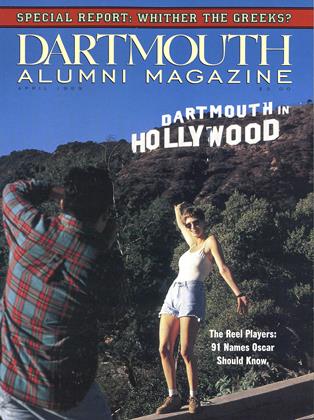Let me establish my credentials: I am a '68 and the father of an '02. I was a fraternity member and I drank (in fact, on one pledge night I drank enough to get hospitalized at Dick's House). I have read everything on the web sites put up by the administration, DailyD, and Dartmouth Review. I have also read a lot of Blitz-Mail forwarded to me by my son. I am amazed, though hardly surprised, by the controversy. President Wright is very astute to observe in his memo to the Dartmouth community that this all boils down to 1) fraternities/sororities as a refuge from coeducation; and 2) organized, heavy drinking.
When my son decided to go to Dartmouth, I was excited that he would be attending a far better Dartmouth than I had. In my day, road-tripping was the key to sanity, but now, I gushed, Mt. Holyoke, Smith, and Wellesley are right across the hall! Of course, I recall chipping in for a keg on a Tuesday night at the House, but mostly we talked about how horny we were, not so much about the meaning of life. I was also a member of the Cutter Hall experiment. (Before it became African-American, Cutter was Dartmouth's first and only program dorm, and unlike the current Wheelock Cluster, totally student-run.) That was where the meaning of life got discussed.
Life, the real world, is coed and multi-racial, and Dartmouth should be, too. Dartmouth is not a polity in which constituents have rights. It is an educational institution, and it would be derelict in its duty if it did not have a perspective a bias, a framework. That framework used to be single-sex when I was there, and then it became academically coed, though not fully so residentially. Now the Trustees have decided to complete the transformation to a coed college by eliminating ("substantially") the last organized refuge of sexual segregation, namely, the fraternities and sororities. Bravo, I say.
Students have been invited to participate in (though not control) the process, and that decision-making may well show the nation how a non-sexist and non-racist college can be made to thrive, and not just be politically correct. I envy them the opportunity.
Although coeducation is about to become the norm, exceptions may indeed be allowed. Just as Butterfield is a substance-free dorm, mono-sexual and monoracial residences may be allowed as an alternative for minorities (not the present overwhelming ma jority of almost 20 mono-sexual Greek houses). I would imagine the current African-American, Latino, and Native American residence halls would survive, along with Butterfield and perhaps one all-male and one all-female house. And I would "hope these would all wither away in a decade or two, in favor of interest-based rather than race- and sex-based housing.
Booze is a less tractable issue, if only because both the administration and the student body appear to evade discussing why students drink so much. The administration is like the parent who either thinks all misbehavior requires psychotherapy or blames all misbehavior on peer pressure. In fact, most kids who "misbehave" come from unhappy families, and most Dartmouth students drink because Dartmouth is a high-pressure, painful environment, and alcohol remains, after millennia, despite competition from dope and sex, the most popular painkiller ever discovered.
Students seem to think that "hoisting a few with the bro" is what they came to Dartmouth for. In fact, many students drink because they're lonely and stressed, and kegs and open bars make it a lot easier (and less expensive) to drink, than do, for example, the rowdy Williamstown bars that replaced fraternities at Williams (and which will mushroom on Allen Street the moment Dartmouth's fraternities disappear). If Wright really wants to curb binge drinking at Dartmouth, he'll have to be the first college president to really curb loneliness and stress. Lotsaluck!
I think Dartmouth students are segregated by gender and race more than is healthy, but they are also age-segregated in a way that aggravates the stress of a demanding academic environment. Inviting one faculty family to live in each dorm, as some colleges do, is no solution. But the faculty must seriously reconsider how little contact they have with their students outside of the classroom building. Some of my most cherished memories from the older, smaller Dartmouth are the govy seminars that occasionally met at professors' homes over home-cooked meals, and the pot-luck suppers that we invited our favorite profs to at Cutter, and, yes, the serious, coat-and-tie, faculty cocktail parties we invited our favorite profs to at my fraternity. How much of that is still happening at Dartmouth?
To the students I say this: These are the questions you ought to be asking, instead of clinging petulantly to old traditions that failed long ago. Jim Wright is not some new broom sweeping clean; he's been around for 30 years, and he cares about Dartmouth as much or more than you do, who've only been around for three or four months, three or four years at most. Give the guy a break. Give your-selves a chance.
Will the revamped socialsystem change Dartmouth'sdrinking culture?
 View Full Issue
View Full Issue
More From This Issue
-
 Cover Story
Cover StoryBig Green in Tinseltown
April 1999 By Holly Sorensen '86 -
 Feature
FeatureProps, Wingers, And Keepers Of The Old School
April 1999 By Stuart Krohn -
 Feature
FeatureUFOs Are Real!
April 1999 By James Zug '91 -
 Feature
FeaturePeople of the Book
April 1999 By Michael Loventhal '90 -
 On the Hill
On the HillThe New Social Order
April 1999 -
 Article
ArticleA Greek Tragedy
April 1999 By Kevin Goldman '99
Article
-
 Article
ArticleComing Events
October 1941 -
 Article
ArticleWITH THE BIG GREEN TEAMS
NOVEMBER 1962 -
 Article
ArticleA Small Contribution but ...
June 1975 -
 Article
ArticleThe Coming Month
February 1954 By CLIFF JORDAN '45 -
 Article
ArticleThe Mystery of the Wah Hoo Wah
NOVEMBER 1965 By JOHN B. STEARNS '16 -
 Article
ArticleThayer School
November 1960 By RUSSELL STEARNS '38

